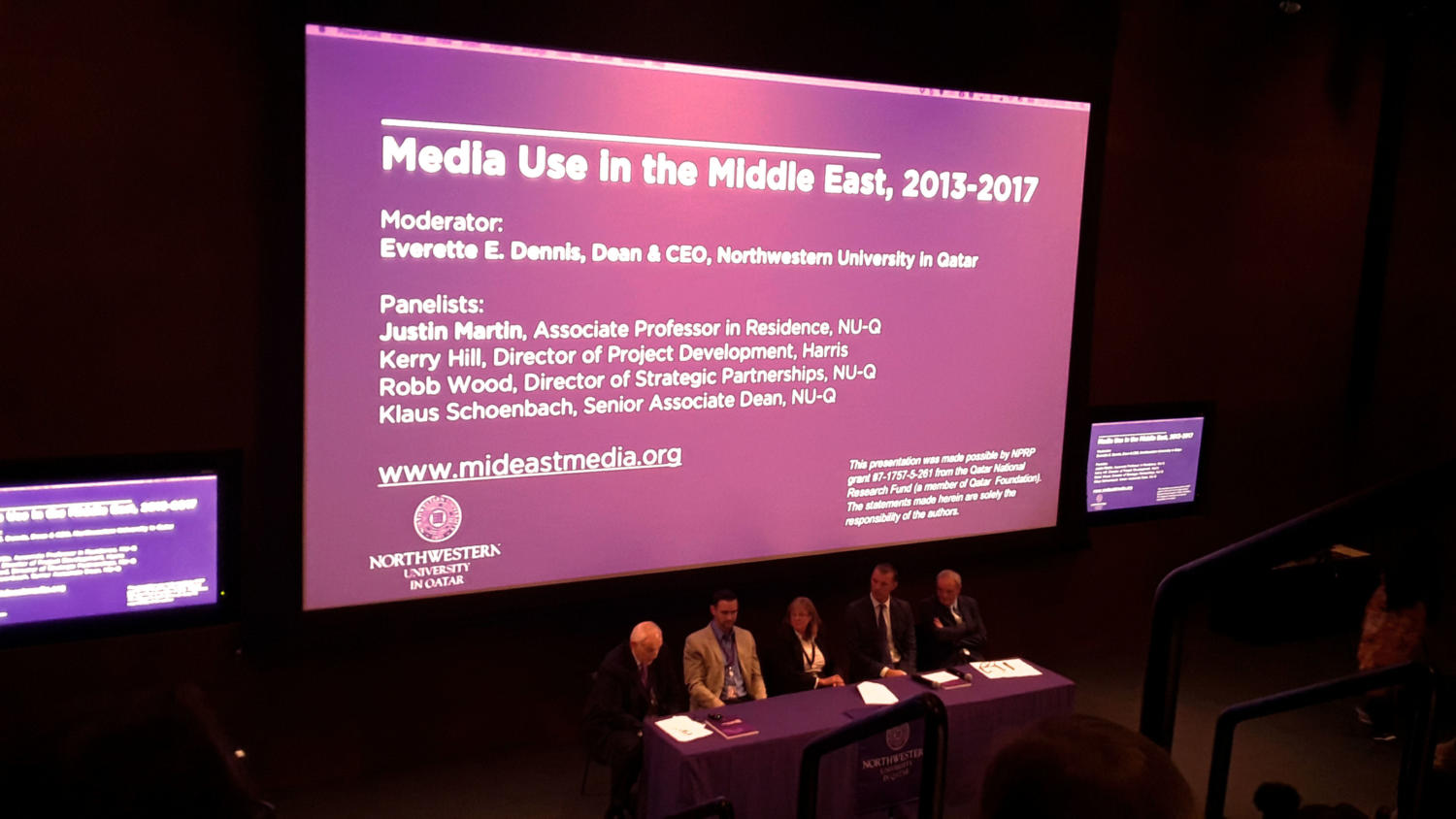NU-Q releases Media Use in the Middle East 2017 survey

Media attitudes and consumption trends are changing in the Arab world, according to the latest findings of Northwestern University in Qatar’s annual Media Use in the Middle East survey that were presented in a panel discussion at the university on Tuesday, Sept. 19.
Support for internet regulation is on the rise, with 59 percent of Arab national respondents saying internet in their country should be more tightly regulated to protect people’s privacy, according to Justin Martin, a panelist and co-author of the study who is an associate professor of journalism at NU-Q.
In addition to Martin, the panelists included co-author of the study, Robb Wood, who is the director of strategic partnerships at NU-Q, as well as Klaus Schoenbach, senior associate dean at NU-Q, and Kerry Hill, director of project development at The Harris Poll, the American polling organization that conducted the survey. They shared key results on internet and social media use, free speech and privacy from seven Arab countries that were surveyed. More than 100 students, faculty, staff and members of the media industry in Qatar attended the presentation.
Everette E. Dennis, dean of NU-Q, was the panel’s moderator and launched the Media Use in the Middle East survey in 2013, which tracks and records media use and attitudes in the region and also challenges multiple stereotypes and myths in the industry. The survey is a statement of NU-Q’s commitment to freedom of expression and could be used in the classroom and for the benefit of academia, media industries and other institutions, according to him.
“In the last two years, [the study] has been quoted day in and day out,” Dennis said. “There are such stereotypical pictures of the Arab world in Western media, (such as that Arabs don’t read), and this data suggests the opposite.”
In collaboration with the Doha Film Institute and the Qatar National Research Fund, NU-Q carried out more than 7,000 interviews in Lebanon, Saudi Arabia, Tunisia, Qatar, Jordan, the United Arab Emirates and Egypt. All interviews were conducted face-to-face with respondents aged 18 or older, except in Qatar where interviews were done via telephone.
Collecting results for the study was not easy, Martin explained, as they were initially unable to conduct the survey in Egypt at the beginning of 2017 when the government banned public opinion polling. Eventually, they were given permission to carry out the study in June and July, although each of the other countries’ data had already been collected in February and March, he added.
“In all previous years, we surveyed Egypt at the exact same time that we’ve surveyed the other countries,” Martin said. “While it was frustrating…we were very pleased that the Egyptian government changed their minds. It wasn’t just us. They haltered a lot of other public opinion research…Hopefully next year we won’t have the same problem, but who knows.”
Looking to the future, Dennis mentioned how data may become even harder to collect because of the blockade in Qatar and the rise of fake news, media surveillance and hacked websites.
The study’s popularity has been growing among the NU-Q community as well as around the worldThis year, Marium Saeed, a NU-Q alumna, helped conduct the study. Additionally, the survey contributes to the World Internet Project, an international, collaborative project that looks at the social, economic and political impact of the internet and other new technologies, of which NU-Q is a member. Each year, this study is also presented at the Qatar Media Industry Forum, where leading individuals and organizations from across Qatar’s growing media sector come together, as well as at Northwestern University’s home campus in Evanston, Illinois, and various other academic meetings.
Rui Xin, a freshman at NU-Q and a member of the audience, learned about this study for the first time at the presentation. “It is really intriguing to see the change in significance of each social media platform here in the Middle East region over the years,” she said.
Dennis welcomed different perspectives on the study, adding, “this is a great regional conversation – this is what it’s all about.”












